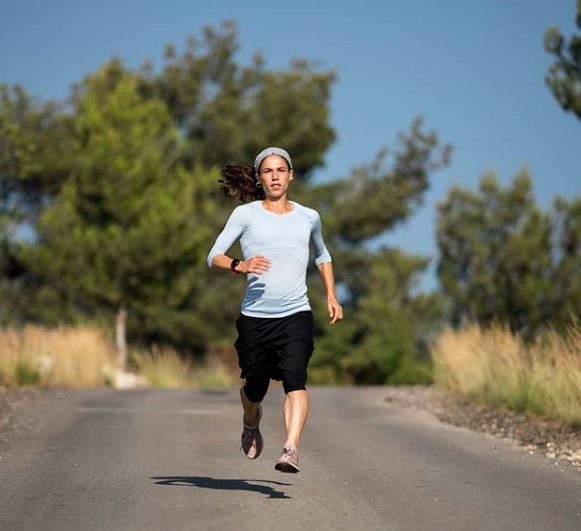Beatie Deutsch inches towards her Olympic marathon dreams
Improving her time by 10 minutes over the course of a year, the two-time Israeli national champion still has some obstacles to overcome on her way to Sapporo

In her ongoing quest to represent Israel in the marathon at the Tokyo Olympics, Beatie Deutsch has overcome yet another obstacle. She and her coach calculated that a 2:34 performance at the Tiberias Marathon (Israel’s national championship) on January 3 would bring her world ranking up to within the top 80 worldwide (the maximum number of athletes allowed into the Olympic marathon). Her personal best, from the Capetown Marathon on September 15, was 2:36:41. Then a change in the rankings caused her to lose some ground, and she learned she would have to run 2:32. Deutsch won the national championship for the second time, in 2:32:25, bringing her personal best down by 10 minutes over the past year and her World Athletics ranking up to #76.
The rankings are updated every week, and are constantly shifting as athletes deliver new results. It’s assumed that roughly the first 40 athletes will achieve standard, and the rest will go based on their world ranking.
Olympic standard is 2:29, which is still three minutes faster than Deutsch’s personal best. But selections don’t happen until May, and the runner plans to race again in an effort to boost her position. Athletes ranked in the top 40 are automatically selected (provided their national federation is prepared to send them to Tokyo), regardless of whether they have standard.
RELATED: Beatie Deutsch: from non-runner to Israel’s national marathon champion in three years
Deutsch’s story is unique. Raised in an ultra-Orthodox Jewish family in New Jersey, she met her husband Michael on an extended trip to Israel in 2009, and the couple decided to emigrate. Deutsch had always been athletic, but only took up running in 2015. She’d had four babies in six years, and disliked the feeling of being out of shape. (She had her fifth baby two months after her second marathon, in 2017.) Her religion’s modesty requirements mean she races with her hair and legs covered. A year ago, she became the Israeli national champion (the first time) in her fourth marathon, with a time of 2:42.
In a social media post on December 26, the runner comments on what it’s like to appear different from other athletes. “When I ran my first international marathon in Capetown, I spent two days prior to the race with all of the elite athletes. I was definitely the slowest, most oddly-dressed runner there, and I remember every time I introduced myself, I made sure to follow up with ‘I left my five kids at home’ or ‘I actually just started running 4 years ago.’ It was as if I had to justify why my previous race PR was only 2:42.” She says she has stopped trying to make excuses for why she is not as fast as other athletes, and focus on training to be better instead.
Deutsch keeps training and racing, and her marathon time keeps coming down. But she faces another obstacle on her road to Tokyo: with the decision to move the marathon to Sapporo, the women’s marathon, originally scheduled for Sunday, August 2, was changed to Saturday, August 8.
As a deeply observant Jew, Deutsch would not race on a Saturday. “When I decided to pursue my Olympic goal in January,” she said in a Facebook post, “the first thing I did was check the marathon date to make sure it wouldn’t conflict with Shabbos (Sabbath). It was scheduled for Sunday, August 2 and so I knew I could compete. When they announced the World Championships would take place on Shabbos, I remember not even feeling disappointed because I knew I had the Olympics.” That all changed with the rescheduling of the Olympic marathon.
Israel doesn’t send many runners to the Olympics, but it boasts one of the strongest in Kenyan-born Lonah Chemtai Salpeter, the 2018 European champion in the 10,000m who broke her own national marathon record at Prague in 2019 in 2:19:46. Salpeter competed in the Olympic marathon in Rio in 2016, but did not finish. She is currently ranked #7 in the world rankings.
There are no other Israeli marathoners in the World Athletics rankings who could challenge Deutsch for a spot. The question is whether she’ll be able to overcome the other obstacles standing in her way.
“I’m here for the ride and I have no idea how it will turn out,” Deutsch wrote in a social media post. “I knew that improving my time would be valuable as an athlete, no matter whether I could actually run in the Olympics or not…
“I may not make it to the Olympics… I may not make the standard or I may not be able to run a race that is on Shabbat. But one thing I do know is that I will continue to proudly represent what it means to be an Orthodox Jewish women and professional runner for Israel.”


